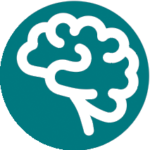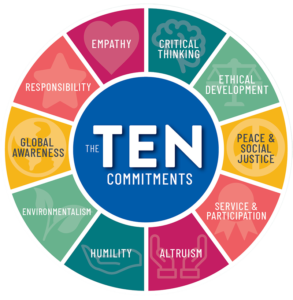Living Humanist Values: The Ten Commitments
WHAT IS THE DEFINITION OF HUMANISM? How does one live as a humanist?
Like many of you, I have read a plethora of articles and longer works defining humanism. Each proclaims a different emphasis highlighting various aspects of what is valued by humanists. Some declare humanism to be a religion, a life stance, or a worldview, while others profess it to be a progressive philosophy, an ethical perspective, or a belief system. Usually, an array of principles is provided as a list of what’s key to humanists—affirming human worth and dignity, reason, compassion, morality, ethics, democracy, scientific inquiry, naturalism, and critical thinking with no adherence or affirmation of a divine creator or other supernatural force. None of the definitions are entirely conclusive, and all are correct in outlining the fundamentals of humanism.
However, this brings little clarity to what humanism is or how one lives as a humanist. Without a definitive set of beliefs, dogma, or scripture, humanism appears nebulous, which is the main reason we at the American Humanist Association Center for Education have developed the Ten Commitments.
Whereas the Ten Commandments of the Hebrew Bible are a set of strict rules dictated by God, the Ten Commitments stand on their own as humanist values to maintain and strive to practice daily. They propose we put our values into action to work towards positively impacting our communities and society. In their simplicity, the Ten Commitments ultimately define what we are about and what we stand for. I also see the Ten Commitments as an avenue for collaboration—a gathering point for all humanists to work together.
Now, having grown up humanist and having worked in a variety of professional capacities in the movement, I’m very aware that within humanist circles, independence of mind is a significant priority—a venerated value for those who feel they narrowly escaped the confines of a religion that was “commanding” and, in some cases, repressive. And so many may initially feel the Ten Commitments smack of a directive authority and should be rejected.
However, I think the Ten Commitments are less about absolutes and serve more as a guide to putting our beliefs into action. They hold us accountable to our values. They ask humanists to be proactive versus reactive. They demonstrate that being humanist involves doing what is inherently right to ensure the well being of everyone and everything in this world. They inspire me to be better as a person and do better as a humanist.
It is my hope that readers find similar value in them. (A simpler version has also been developed for use in educational settings with younger humanists and in various other promotional ways). The AHA Center for Education plans to build a curriculum around the Ten Commitments that would also appeal to others in a variety of secular settings, such that the Ten Commitments become not only widely accepted character education, but a guide within professional settings promoting health and wellness.
Download a PDF version of The Ten Commitments
The Ten Commitments
 Critical Thinking
Critical Thinking
As we are each bombarded with a constant stream of information, it can become challenging to decide what is accurate and true. Thinking critically allows us to make sense of all this information and reason our way to good judgments and effective solutions to the problems we face while rigorously avoiding pitfalls like rationalization, conformity, and stereotyping. This process forms the basis of the scientific method, which opens the door for new discoveries through hypothesizing and experimenting. Critical thinking is a skill that requires continued attention, practice, and reflection. Exercising our minds to build these skills enables us to challenge biases in ourselves and in others, paving the way for a fair, open-minded, and autonomous perspective that fosters a multicultural worldview.
 Ethical Development
Ethical Development
The key to understanding ethical development is acknowledging that nobody is perfect or has all the answers. Ethical development is a never-ending process that requires constant reflection and evaluation of our personal choices and the consequences they have on others. Fairness, cooperation, and sharing are among the first moral issues we encounter in our ethical development as human beings and are often embraced intuitively, but each new day carries with it new challenges and new moral dilemmas. We should continually adapt and rebuild our moral frameworks with the goal of becoming ever better human beings.
 Peace and Social Justice
Peace and Social Justice
True peace involves an intense commitment to social justice and affirms the human rights and personal autonomy of all people. Any level of injustice against groups or individuals signifies existing conflict, even if the conflict isn’t immediate or obvious. We attain peace only by consistently responding to injustice through thoughtful conflict resolution that aims to repair harms and ensure a fair and equitable society moving forward. This kind of conflict resolution is known as restorative justice. In order to achieve a just, peaceful society, we all must take claims of injustice seriously and ensure that those who are impacted most by rights-violations determine the best course forward.
 Service and Participation
Service and Participation
Service and participation means putting values into action in ways that positively impact our communities and society as a whole. It fosters helping others, increasing social awareness, enhancing accountability, and many attributes of the other nine commitments. Engaging in service doesn’t just make the recipients better off, but those who serve can develop new skills, experiences, and personal satisfaction that all promote personal growth. We must all recognize that we are members of a group, and engaging in service to benefit the group and the other individuals in it makes us all better off.
 Empathy
Empathy
Empathy means entering imaginatively into another’s situation in an attempt to understand their experience as though we are experiencing it ourselves. Empathy requires a person to step outside of their own perspective to consider someone else’s thoughts, feelings, or circumstance from that person’s point of view. In many ways, empathy is the first step to ethical behavior as it allows us to respond compassionately to the suffering of others and exercise good judgement when our actions may affect someone else. Understanding another’s perspective is not only critical to building better relationships, but also makes us better citizens in our local and global communities. Empathy promotes tolerance, consideration, and compassion amongst us all.
 Humility
Humility
Humility means displaying modesty about accomplishments, talents, gifts, or importance of self. It acknowledges we humans are fallible and have limitations in what we know and can do. Being humble isn’t about having low self-esteem or denigrating oneself. Humility at its core is robust self-awareness—awareness of our strengths and weaknesses, our faults and our merits. Humility involves setting aside personal pride and overcoming our egos to embrace gratitude for what you have and appreciate others for who they are. In being humble, one recognizes their own value in relation to others; inherently, you are neither better nor worse than anyone else.
 Environmentalism
Environmentalism
Regardless of our individual identities, we all share the same home: planet Earth. Just as we depend on the planet to sustain us with its precious resources, this planet’s ecosystems depend on us to be good stewards and take responsibility for the impact human activity has on our shared planet. Disregard for the large-scale impacts humans have on our environment has caused extensive harm to earth’s ecosystems. Despite this, humanity is also capable of positive environmental change that values the interdependence of all life on this planet. Each of us must acknowledge our collective and individual mistakes, repair past damages, and purposefully work toward cultivating rich, diverse, and resilient ecosystems.
 Global Awareness
Global Awareness
We live in a world that is rich in cultural, social, and individual diversity—a world with rapidly increasing interdependence. As a result, events anywhere are more likely to have consequences everywhere. Global awareness broadens our knowledge of cultures and perspectives that are outside of our own experience. A true global awareness includes attention to both current and historical events, and acknowledges how we affect—and how we are affected by—the interconnected social, political, and economic systems in which we reside. The end-goal of global awareness is global citizenship, which recognizes our personal responsibility to foster a healthy and dignified life for everyone in our global community.
 Responsibility
Responsibility
Every day, each of us makes choices. These choices, large and small, all have consequences—for ourselves and for the world around us. Moral responsibility involves taking conscious ownership of one’s intentions and actions, and being accountable for the resulting consequences. Although we all live in a society with various cultural values, expectations, codes of conduct, and social mores, ultimately we all decide for ourselves what is right and wrong. Being a responsible person involves steadfast attention to what is right and willfully bearing the blame or praise for our own actions.
 Altruism
Altruism
Altruism is the selfless concern for the welfare of other living beings without expectation of reward, recognition, or return. The collective welfare of our communities and society depends on the welfare of each individual person. We should always seek to alleviate the suffering and hardships of others with compassionate action. By caring for others around us and lifting each other up, we reinforce healthy connections and contribute to the betterment of our community, society, and the world.

